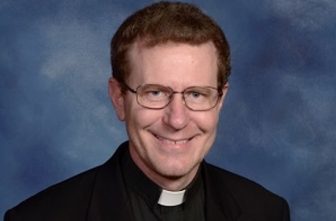
Kenna Millea and her husband, Pat, felt called to offer their gifts to the Church in an “intentional” way — she as a licensed marriage and family therapist, he as a speaker and parish minister. In 2022, after much discernment, they founded The Martin Center for Integration — which offers faith-based mental health services for individuals, couples and organizations — and they host a free podcast called “This Whole Life.” As parents of seven, ages 4 to 13, and members of both St. Agnes in St. Paul, where their kids attend school, and St. Joseph in West St. Paul, the couple was already busy. But helping Catholics cope with mental illness, they say, feels more needed than ever. “The harvest is many and the laborers are few,” Kenna, 41, said in an interview.
Q) Last year you moved from West St. Paul to Cottage Grove, leaving the house where your family had lived nearly a decade. Did you do a massive purge?
A) It helped me grapple with this theme of poverty of spirit. Throughout my life, for a lot of reasons, there’s been this urge in me that if I have the material needs that could be necessary at any given moment, I’ll be OK.
We didn’t bring 30 percent of our stuff with us — whether we were sharing it with friends or the people who bought the house, who have younger kids. If I can have this spirit of generosity in letting go, I can trust that others would do that for us if we needed a coat at a moment’s notice. It was a way of surrendering to God’s providence and realizing that what we need in this moment isn’t much.
Q) Do you feel lighter?
A) Absolutely! I joke that I’m going to have more Scandinavian minimalist vibes and let the walls be bare for a bit. The family and the community that we draw together — that’s what makes this a home. The artwork or so-called perfect furniture is just a bonus.
Q) Is there more mental illness now or are we simply more aware of it?
A) People are more willing to speak up about their experiences. A lot of it was closeted for so long. But I also think there is more mental illness. When the culture around us creates a dissonance from our own values, that can draw out anxiety and depression.
Q) Can the case be made that what is sorely lacking today, a sense of integration, is a distinctly Catholic concept? That the Church has been upholding the connection of body, mind and soul for centuries?
A) Absolutely! It has been present. It is the incarnation: God becoming man. Is there a more integrated event than that, to wed heaven and earth in the liturgy? We as a Church embody the life of incarnation on our best days.
What forces chip away at that integration? It’s when the internal voice isn’t strong enough and then it encounters those opposing external voices that there’s confusion. The visual I have is a leaf in the wind, being blown whichever way versus having this strength that comes from being grounded in the reality of who God is and who he has made us to be.
Q) And that informs everything.
A) Yes. I was just talking to someone about reclaiming Sundays and why the Lord commanded us to keep the Sabbath holy. Monday through Saturday, we go out into the world and get bumped and bruised and banged up — because that’s our mission, to be there for others — and we come back on Sundays to reorient. I love that word. On the podcast, we talk about what practices can help reorient ourselves to these truths: who we are, who God is, what we’ve been made for. Without that, we experience despair and anxiety and confusion. It’s so easy! I experience it if I’m on social media for too long without some intent and purpose.
Q) What’s the response to the Martin Center for Integration been so far?
A) The response has been not only positive but honestly a bit overwhelming to hear how many organizations have been struggling and didn’t have a place to go. There’s this relief among so many, particularly leaders from organizations, who are like: “Yes! Thank you! We’ve been waiting for you.”
Q) You must’ve been heartened last year when Bishop Robert Barron helped launch the National Catholic Mental Health Campaign through the U.S. Conference of Catholic Bishops.
A) The backstory is they were in one of their meetings and he had put it on their agenda to discuss, and by the end of the meeting, there was a campaign. There was a storm of agreement: “Yup, we’ve got to get in there!”
It’s exciting to be a Catholic therapist right now and to have the bishops backing us up. The secular culture is way ahead of us in terms of research. We didn’t have the resources before, and it’s a great hope that in the decades (ahead), we’ll be able to do the research and link the social science with the theology to really give us a better picture of the totality of the human person. We’ve got to be doing our own studies and analyzing the data ourselves and put a dog in the fight. I want to believe it could actually be a conduit of evangelization.
Q) You’ve grown quickly. You have 10 clinicians on staff now, and your offices are at St. Helena in south Minneapolis in the old convent.
A) If these walls could talk! Our big room was the sisters’ rec room. I would like to think they would say to us, “I am so glad you have heard God’s call and that you’re using your gifts for his glory.”
It’s a privileged place to be. Father Markus (Milless) is very generous; they have daily Mass and daily confession every morning for the parish community. Most days, there are members of the MCI team over there. And we have clients who benefit from being there, who have a storied history with the Church, a mixed bag. To be able to walk around a church at 2 o’clock on a Tuesday afternoon when no one is around — there’s no priest, there’s no pressure to feel a certain way or participate, but just to let the body be in that physical place — there is some processing going on there and, God willing, it’s part of the healing process. That is a gift that I never imagined would be so good.
Q) How do you add beauty to daily life?
A) Engaging the five senses is huge for me. My favorite tea is a knock-off of the Aveda tea. It’s called Egyptian Licorice, and it’s so good. That’s a morning ritual I really look forward to. I’m on an indoor-plant kick. I listen to classical music at night when I’m winding down, and I turn off all the overhead lights once the little kids have gone to bed and just have lamps on until we go to sleep. There are little ways to use the body to signal to my heart, my soul, my mind: There is peace, there is goodness, there is beauty. Ahhh! The Lord has me.
Q) What do you know for sure?
A) God is victorious. I think about the emails I get from clients who I walked with for a season, and I didn’t really know what was going to happen with their marriage or their relationship with their child or their business — whatever was stressing them. The light comes through in some of the darkest places. I can only attribute that to trusting that the victory has been won. It’s Easter season! He’s got this! We have great reason to hope.




